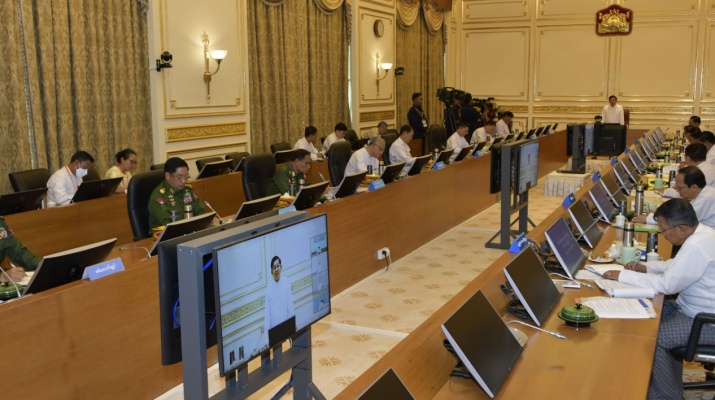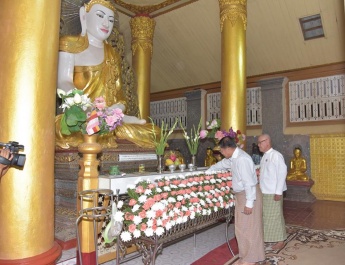NAY PYI TAW June 30
Meeting on promotion of the national economy was held at the State Administration Council Chairman’s Office here this afternoon, addressed by Chairman of State Administration Council Prime Minister Senior General Min Aung Hlaing.
Present were SAC members Admiral Tin Aung San and Lt-Gen Moe Myint Tun, union ministers, the Nay Pyi Taw Council chair, senior military officers from Office of Commander-in-Chief, and officials. Region/state chief ministers took part in the meeting through video conferencing.
The Senior General said it is an important meeting for national economic promotion. Regions and States that are running production businesses and the ministries that are conducting business operations will have to discuss means for national economic promotion. The national economy resurged in the financial year 2022-2023, registering a 3.2 percent rise. But foreign trade still has the requirements. The volume of fuel and edible oil imports is still high.
The country adopted a market economy alongside the democratic reforms in 2011. The first term of democratically elected government saw a rise in investments and a certain degree of national economic growth. Growth rate exceeded eight percent, but in the final year, there was a slight drop in economic growth. Economic prospects were bright during the first year of the second term of the democracy government, but the economy started to fall from the third year. National economic growth was merely over 3 percent in fiscal year 2019-2020. In the following years, it dropped to the minus zone.
Four ministries were assigned to find out the causes of the national economic downturn. According to the findings, economic fluctuations are based mainly on production, national income, exports, investments, natural disasters, weak economic management, and defects in implementing projects. Moreover, the nation faced losses due to lack of timely action. Additionally, some of the foreign organizations and countries were providing financial support through various channels to the government that would dance to their tune as a means to exaggerate its performance.
According to analysis, economic changes depend on national income that comes from trade and other sources. Economic prosperity also depends on the richness of human resources. Increase in human resources will bring about national economic development as they can improve the economic and production sectors. The calculation of GDP in the majority of countries is based on the agriculture sector, industrial sector and services sector. Myanmar’s GDP is at the 7th or 8th position in the ASEAN. Country-wise GDPs in 2022 were Thailand, US$- 536.16 billion, Malaysia, US$- 407.923 billion, Vietnam, US$- 406.452 billion, and Myanmar, nearly US$- 60 billion. Thailand, Malaysia and Vietnam are developing countries that are gaining momentum in industrial and trade businesses. But agro-based goods are their principal products. The gap in farm products between any one of those countries and Myanmar is so huge.
Production industry of Myanmar is still small. Effectiveness is also weak in land use. As the country cannot utilize its land, water and human resources with utmost efforts, the agriculture sector’s contribution to the GDP is still small. Most of the industries are manufacturing agro-based products. Money supply and services sectors are based on the volume of products. Fewer products means a weaker service sector.
The goal of rice per acre yield is 100 baskets, and now the average per acre yield is around 75 baskets. The country puts about 15 million acres under monsoon paddy annually and is exporting about 2.2 million tons of rice and broken rice. If per acre yield can be increased to 100 baskets, the country will produce 375 million more baskets of rice. If calculated with the average per basket price of Ks-10,000, there will be a Ks-3,750 billion increase in the earnings. Due to income increase farmer’s spending will also rise, and eventually lead to rise in the domestic buying power. Because of the production growth, there will be a Ks-8,000 billion upsurge in the supply and demand sector. The country’s earnings will increase in millions if extra rice can be exported. The country put 14.9 million acres under monsoon paddy this year. Over 13 million is paddy land, and multiple cropping is conducted on 6.6 million acres. If the beans and pulses, sunflower, tapioca or any kind of crop is cultivated on the remaining 7.3 million acres and per acre production value is calculated at Ks-1 million, products worth Ks-7,300 billion will come out. Hence, if the land can be used effectively, the agriculture sector’s contribution to GDP and exports will significantly increase.
In 2022-2023, the country put 800,000 acres under edible oil (not including palm oil). According to area-wise per-acre yield rates, a total of 690,000 tons of oil will be produced. If all those yields of edible oil crops are milled into oil, the country will enjoy 126.2 percent cooking oil sufficiency. But crops such as groundnut and sesame are consumed in other ways or exported.
But the cost of oil imports is higher than that of the oil crop exports. If exported oil crops are sent to local oil mills, the country will enjoy domestic oil sufficiency. If all area-wise goals are met, domestic oil sufficiency will reach 249.5 percent. Hence, increase in edible oil crops production will reduce the cost of imports which is US$-600 million per year. Myanmar is at the second or third place in the world in bean and pulses exports. Green beans, pigeon peas, and mung beans are the major export items. Beans and pulses have a ready market. Hence, if the country can increase per acre yield and cultivate beans and pulses on the remaining over 7 million acres, its exports will surely rise. Hence, rice, oil crops and beans and pulses are the main crops that can boost GDP growth. Hence, the region/state chief minister should give priority to cultivating these crops.
In 2011-2012, there were over 800,000 acres of cotton plantations, and the number decreased to 389,000 acres in 2020-2021. Such a significant decrease has resulted from the lack of encouragement, according to growers. If the 800,000 acres are to be systematically grown, there will be domestic sufficiency in cotton. It is necessary to boost cotton growing domestically and for export purposes. With the enough supply of fertilizers and irrigation water, there will be high yields.
Kitchen crops such as garlic, onion and potato are essential for the country. Garlics are being imported while potatoes can be grown only for domestic consumption. As the per-acre yield of those crops is low, the regions and states should try to boost their cultivation. Garlic, onion and potato play a role in the effort to improve the country’s economy.
If the cultivation and production of coffee and tea that are internationally marketable is successful, there will be more income. Therefore, the successful cultivation of rice, oil crops, beans, cotton, kitchen crops, tea and coffee will change the agricultural sector tremendously.
Regarding the livestock sector, chicken, pigs, goats, cows and fish are thriving in the country. But, fish and meat prices are increasing. Mass production will ensure greater sales. Livestock needs to be bred to have balanced supply and demand. Animal feedstuffs can be domestically produced from agricultural products in the country. Moreover, there is a lot of land space rich proteins for growing grass. High prices have come from low production. Thus, the regions and states need to try harder.
Despite having favorable conditions for domestic manufacturing, the lack of encouragement for production has led to more imports. For example, dairy products, paper, bicycles, motorcycles, tyres and tubes have to be imported by spending millions of foreign exchange. Likewise, cotton and textile have to be imported. They were domestically produced in the past. But with the lack of encouragement, many factories stopped their operations. Boosting production of dairy products, rubber-based goods and textile will increase the country’s GDP in the agricultural and industrial sectors.
With low production and exports, there have been trade deficits over the past many years. From 2011 to 2016, there was a trade deficit of over US$-12 billion and from 2016 to 2021, US$-12.61 billion. Those trade deficits were covered by spending on non-trade income. In the first and second terms of the democratic governments, there were international loans and cash assistance. It was found that they used that money for spending foreign exchange. When the State Administration Council assumed the State duties, the international community had come to impose sanctions. They resorted to various ways to prevent the country from spending its foreign currencies and getting the sales from its products. If the country continues to import goods as much as it needs without considering exports, there will be more and more foreign exchange needs.Therefore, manufacturing businesses are responsible for producing goods as much as possible.
Frugality is necessary, except for essentials. Expenses should be as few as possible to prevent waste. The saving of even small things can help reduce domestic and foreign deficits. Therefore, domestic products should be used rather than foreign products.
Measures are being taken with care for tapping underground resources. Yet, there are illegal extractions. There is also illegal smuggling of timber logs that are aboveground resources. These are greatly affecting the State revenues. Responsible officials need to take supervisory measures for this. In border trade, the country needs to act as a good neighbor.
When it comes to the national economy, it is necessary to encourage domestic production and ensure honesty. The region and state governments are urged to initiate two parts in engaging in productivity. In the efforts for boosting production regionally and nationally and for export purposes, the respective regions and states must try to boost agricultural and livestock production without fail. For import-substitute products, paper, rubber products, dairy products and textile products should be domestically manufactured as much as possible.
For agricultural activities, chemical fertilizers will be imported to a certain extent. Natural and bio-fertilizers should also be used. Plans are being made to produce chemical fertilizers domestically. Under the previous government, hydropower projects were halted or suspended for various reasons. The country still faces electricity shortages. Meanwhile, electricity supply is being disrupted due to terrorist attacks on power supply facilities. Efforts for implementing smallscale hydropower projects and solar products will meet the domestic power consumption
in one way. Gas-fired power can also be used for power generation. The country is rich in fresh water resources, and irrigation water can be supplied through river-water pumping projects.
It is necessary to conduct market and production researches concerning the products. Research must be conducted constantly for production of goods which are in demand in foreign countries and of high quality. Therefore, we are responsible to conduct research constantly so that agricultural products are of high quality. In our country, trade is greater than manufacturing. Illegal trade and illegal exploration of natural resources is a blow to the economy of the country.
If state and regional governments exert efforts to produce goods in demand by carrying out manufacturing activities that can generate sound earnings, current high commodity prices can be reduced while foreign exchange earnings can be increased by production of export items. Therefore, it is time to exert efforts to achieve economic growth, to boost production and to reduce spending out of patriotism. The meeting will help explore the matters related to boosting the economy of the country and implement them.
Then, Deputy Prime Minister and Union Minister for Planning and Finance U Win Shein reported on current restrictions and ways and means to resolve them, GDP growth between the 2020-2021 fiscal year and 2022-2023 fiscal year (until the end of March), progress made in three major sectors including agriculture, industrial and services sectors, measures being taken for increasing funds for respective funds, loans offered for capital investment from the national economic promotion program, inflation, revenue, spending and debts, matters related to boosting revenue and strengthening the management of state-owned enterprises.
Afterward, the chairman of the Nay Pyi Taw Council and chief ministers of states and regions reported on development tasks being carried out for townships and villages in the Nay Pyi Taw Council Areas and states and regions, MSME development tasks being carried out for agriculture and livestock breeding with the national economic promotion fund, measures taken for boosting yields of respective crops and regional food sufficiency, efforts being made to boost domestic production by expansion of agriculture and livestock breeding tasks and to boost exports and marketing, boosting fishery products and foreign exchange earnings and conducting agriculture and livestock breeding institutes for those who have completed KG + 9.
Then, members of the SAC, union ministers and senior military officers reported on measures taken for profitability of state-owned businesses and factories, facilitating the market economy and the commodity flow of the country, curbing the smuggling activities to create fair market competition, facilitating the commodity and currency flow, expansion of domestic and foreign investment, offering assistance to MSMEs, effectively providing capital investment, quality strains, inputs and technologies to boost production in the agriculture and livestock breeding sectors, boosting exports and importsubstitute products, distribution of products from factories owned by the Tatmadaw and agriculture and livestock breeding farms of the Tatmadaw at cheaper prices.
Then, the Senior General fulfilled the requirements, saying the country exported oil crops like peanut and sesame and producing oil from the crops will contribute not only to domestic edible oil sufficiency but also to production of animal feed from their pulp. Similarly, a large number of bicycle and motorcycle tyres and tubes had to be imported. As such tyres and tubes can be produced at home, respective states and regions are required to take the matter into consideration. It is necessary to properly supervise illegal border trade that negatively affects the revenue of the country. All responsible officials are required to report issues correctly while carrying out duties.
In conclusion, the Senior General urged responsible officials to operate state-owned factories at a profit and to carry out tasks at factories that cannot be handled by the private sector without selfinterests. The country has to rely on manufacturing based on agriculture and livestock breeding and products from the agriculture and livestock breeding sectors are the raw materials for MSMEs. It is necessary to manufacture quality products from the raw materials. It is important to systematically utilize investment capital granted for regional economic promotion for the benefit of the majority of the people. Measures have been taken to develop human resources for the manufacturing sector to boost the economy of the country. Taking such measures aims to future development of the country. As technical science can be studied only when one has studied the basic education, agriculture and livestock breeding and technical training schools have been opened. Human resources are essential. Therefore, state and region chief ministers are urged to make concerted efforts to enable all school-aged children to acquire formal education and knowledge.





